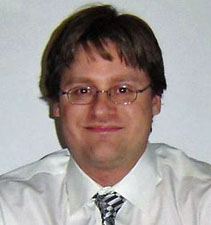Professor Jean-Claude Bradley
The Science News article Scientists Get a 2nd Life said
“I teleport to Drexel Island, where real-life chemist Jean-Claude Bradley sends his avatar, Horace Moody, to meet me. Moody, a spry plum-colored cat, is the first animal avatar, or ‘furry’, I’ve encountered.Despite his initial skepticism, last year Bradley helped establish his university’s presence in SL. He now uses the program to augment his introductory course on organic chemistry. By clicking on an obelisk, students can view a series of molecular images and choose an image that corresponds with a question. The students compete in races to work through a series of 20 to 30 questions, with real prizes awarded for the winner.
Students may also use SL to interact with and create representations of chemical reactions. Last fall, one of Bradley’s students created a life-size model of a camphor molecule for extra credit, now on display on one of the Second Nature islands.”
Jean-Claude Bradley, Ph.D. is Associate Professor of Chemistry and E-Learning Coordinator for the College of Arts and Sciences at Drexel University. He leads the UsefulChem project, an initiative started in the summer of 2005 to make the scientific process as transparent as possible by publishing all research work in real time to a collection of public blogs, wikis, and other web pages.
Jean-Claude coined the term Open Notebook Science to distinguish this approach from other more restricted forms of Open Science. The main chemistry objective of the UsefulChem project is currently the synthesis and testing of novel anti-malarial agents. The cheminformatics component aims to interface as much of the research work as possible with autonomous agents to automate the scientific process in novel ways.
Jean-Claude teaches undergraduate organic chemistry courses with most content freely available on public blogs, wikis, games and audio and video podcasts. Openness in research meshes well with openness in teaching. Real data from the laboratory can be used in assignments to practice concepts learned in class.
His Research Interests are:
- Open Source/Open Notebook Science using Blogs and Wikis
- Cheminformatics and scientific knowledge management
- The synthesis and testing of novel anti-malarial agents via a Ugi reaction
He coauthored Environmental Scanning Electron Microscopy Study of Water in Carbon Nanopipes, Comparison of Methods for Photochemical Phosphoramidite-Based DNA Synthesis, Carbon Nanotubes Loaded with Magnetic Particles, Dimethoxybenzoin Carbonates: Photochemically-Removable Alcohol Protecting Groups Suitable for Phosphoramidite-Based DNA Synthesis, and A study of spatially coupled bipolar electrochemistry on the sub-micrometer scale: colloidal particles on surfaces and cylinders in nuclear-track etched membranes. Read the full list of his publications!
Jean-Claude did his undergraduate studies at Laurentian University in Sudbury, Toronto, and earned his Ph.D. in Organic Chemistry from Ottawa University in 1996. He performed his postdoctoral studies at Duke University with DNA chips and in Paris, France with gene therapy.
Watch his LISE talk on Second Life in the Chemistry Classroom, Cheminformatics and Open Notebook Science, ACS Talk on Teaching Chemistry with Second Life, and Open Notebook Science and Implications for the Future of Libraries. Listen to him on Rod’s Pulse Podcast. Read Faculty Spotlight: Jean-Claude Bradley, Doing science publicly: Interview with Jean-Claude Bradley, and Creating Life-Size Molecules in Second Life. Check out his E-Learning Blog, E-Learning Podcast and Screencast, and Open Science Research Blog.
